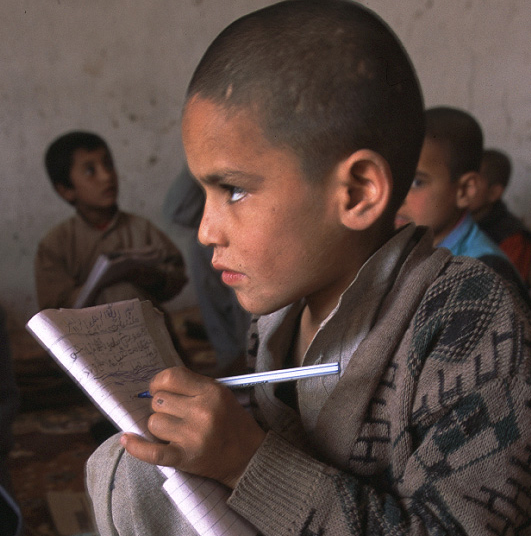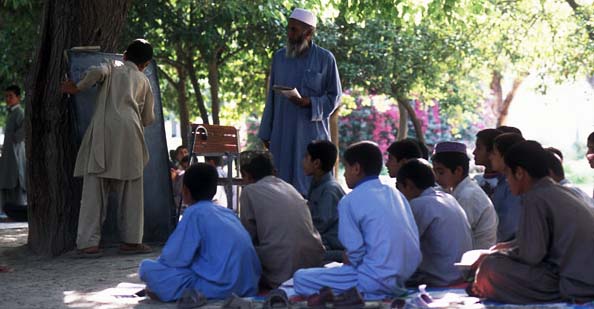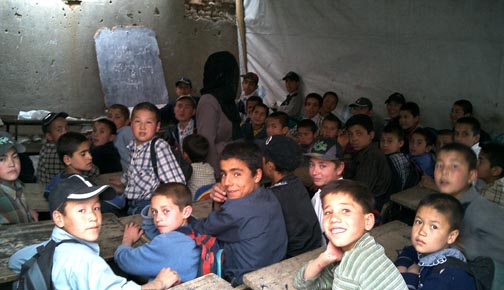The once robust and well respected educational system in Afghanistan has been left in dire state of neglect after over two decades of war. Military devastation of the country has destroyed over 70% of the schools and coupled with the repressive regime of the Taliban, the task of rebuilding the educational system is quite urgent. Two generations of Afghans are illiterate and under the repressive Taliban, formal schooling for girls was banned while boys were only taught an austere fundamental version of religious militancy. There is an urgent need to establish a viable institutional infrastructure for the Afghan educational system because education is the human capital needed for economic development and building a vibrant civil society.
Given the devastated state of the Afghan economy, the funding to rebuild the educational infrastructure will have to come from external donors. This was the conclusion of the 2002 Comprehensive Needs Assessment (CNA) report that was presented by a multi-donor team led by the Asian Development Bank (ADB). The multi-donor team included education specialists from ADB, World Bank, the Islamic Development Bank, the European Community, USAID, and the United Nations group represented by UNICEF and UNESCO. The report outlined the recommendations needed for the next 10 years in a series of quick impact projects that should be implemented urgently. These include projects in early childhood education, primary education, teacher training, emergency school reconstruction and a special education program for disadvantaged groups. It also addressed Afghanistan’s enormous non-formal education needs which are providing literacy and vocational skills to street children, former child combatants, and ex-soldiers. The government of Afghanistan and international funding institutions consider reconstruction of the primary education to be of highest priority. This is justified by the importance of primary education in the education cycle and the magnitude of the issue in Afghanistan. Nevertheless for the last five years, Afghanistan has experienced a number of success stories on the way to revive its once well-respected education system and private NGOs have played a key role in proposing and implementing subprojects and developing effective education practices.
In April 2004, Sonia Nassery Cole visited Afghanistan to assess the various educational and health needs of the Afghan people. During this visit she fortuitously met a charming nine-year old Afghan boy, Farouk, who is the subject of her documentary “Breadwinner.” Young Farouk would get up at the crack of dawn to earn a living for his parents and siblings, and later in the day attend the General Masoud primary school in the outskirts of Kabul. The school building was pierced with shells and rocket fire, there were gapping holes in the walls of classrooms as well as peeling concrete, and electric wires protruding from all sections. The classrooms were not separated by doors but torn green drapes and teachers could hear each other over the din of the students. There was no clean drinking water, and only ramshackle school furniture and outdated books from which the eager students were proudly communicating in broken English with their foreign visitors. How, Sonia wondered, could these bright students have a decent chance at a formal education in such an uninviting environment?
Deeply touched by the studious Afghan children in their dilapidated primary school, Sonia decided that this school was a project that merited rebuilding especially since Farouk, who won a soft spot in her heart, studied there. Our Kabul Office supervised the rebuilding of the General Masoud primary school, funded by Afghanistan World Foundation, which today looks like an elite institution in the dusty city outskirts. The school has smooth cemented and complete walls separating 19 classrooms, new furniture and textbooks and school supplies, and clean drinking water. Best of all, Farouk sends Sonia emails from his computer giving her progress reports on his studies-he wants to visit America and show-off his English skills.


